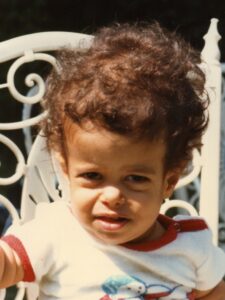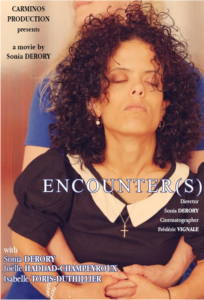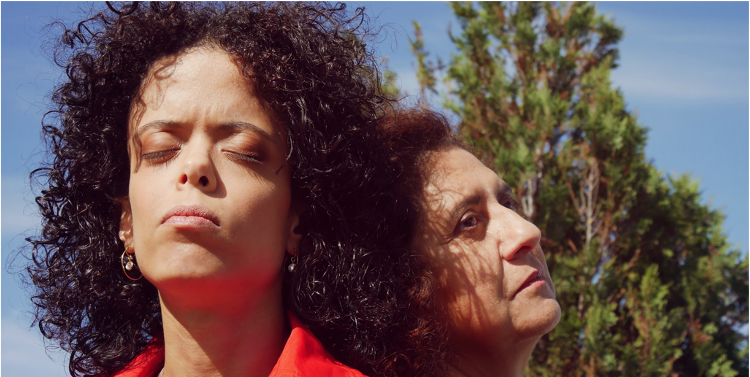Sonia Derory spent the first six months of her life in a hospital in a Parisian suburb while her parents reflected on whether they could raise a child with what they perceived as a disability. She was born in 1983 with dwarfism, a medical or genetic condition characterized by short stature. Ultimately, her parents concluded it would be too great a challenge to raise her and placed her for adoption. After spending another six months in a nursery, Derory was adopted by a couple from a small town in the St. Etienne region in center of France into a family with other children, some also adopted.
Derory had always known she’d been adopted—a fact that otherwise would have been evident because her Algerian heritage set her apart in appearance from her French Caucasian adoptive parents. But she always wanted to know who she looked like and where she came from. Early on, she was afraid to discuss with her adoptive parents her desire to know about her origins. “They weren’t particularly open-minded about my search,” she says, and she felt guilty and conflicted. But in 2006, when she was 23, she searched for her birthmother—not a challenge since her birth parents’ names and identities were listed on her birth certificate.
After several months, she located her birthmother, who at first seemed pleased by her appearance in her life. They were in contact for more than a year and a half, and Derory welcomed her mother into her home. She even wore an identity bracelet engraved on one side with her original birth name and on the other with her adoption name, to demonstrate the depth of her connection. “I did everything—in fact too much—in order to be acknowledged as her daughter because I had this deep-down need to build a relationship with this mother who could help me discover my cultural origins.” After those months, she says, her mother decided to cut ties and all contact, but by that time, Derory had already become very attached to her, so it was deeply difficult to accept—another devastating rupture.
“In her mind she had given me away as a baby many years ago and so felt nothing for me emotionally as an adult woman.” She didn’t want to have any type of relationship, and and they never met again. A few years later, Derory met her birthfather, who told her he’d searched for her when she was very small but was unsuccessful because her name had been changed. He, however, was also unwilling to engage in a relationship with his daughter.
Derory had grown up near her birthplace in Saint-Etienne in east-central France, where she went to high school and developed a love of theater. She took acting and circus classes and workshops but, daunted by the difficulty of earning a living as an actress, she turned to another career. For ten years she worked as a communications and media officer in Clermont-Ferrand, a city in Massif Central, a highland region in Southern France. But in 2014, drawn back to her love of theater, she boarded a train to Paris, intent on becoming an actress. She studied in a theater school and won some small roles in a few classical plays, a television show, and many short movies. She also nurtured an interest in directing and taught herself the necessary skills, learning from trial from trial and error and by being inquisitive on set. Soon she’d use those skills to tell her own story.
Derory had seen stories about people searching for their birth parents but thought they seemed unreal, like fairy tales. “I needed to give testimony about my own life and story that was realistic and true to what had actually occurred.” She particularly needed to address an entirely overlooked topic—adoption and disability. In her short film, “Encounters” [Recontre(s)], she tells the story of what happened during her reunion with her birthmother. Not a documentary, it relies on the participation of an actor who plays the role of her birthmother, and names and documents have been changed. The truth of the story, however, she says, is communicated in the voiceover. “I was faithful to the actual words of the protagonists through the voices—a choice, like the length, partly dictated by financial limitations. Bearing the costs of the film herself, she was restricted technically and materially, which is why the film is done in voiceover rather than with the actors speaking. She also made two shorter versions. One for the Nikon Film Festival, “Almost her Mother” (Je Suis Presque Sa Mere), with a running time of a little more than two minutes, tells the story from her mother’s perspective. And the 45-second “A Tear in the Heart” (La Larme Au Coeur), is from the perspective of a psychologist who mediates the reunion of mother and daughter. The longer story, “Encounters,” is from Durory’s perspective.
Her work is evidence of the importance of storytelling, both for personal healing and to raise awareness of the lived experience of adoptees. “I think everyone can testify on their own level to show their perspective on adoption and help advance the cause of adoptees.” It’s important, she believes, to counter stereotypes that paint adoptees as spoiled, special, or difficult children. “They’re like all other children who just need to be loved and to belong to a family. Sadly, they live all their lives with this wound of abandonment that is difficult to deal with in their social, personal, and emotional lives.”
“Today,” Derory says, “I’m at peace with my story. I can relate and talk openly about my life without feeling emotional, and I think I can say that it’s made me resilient and stronger. I’ve managed to reach many people all over the world who don’t know me and who in turn have been really touched and moved by my story.”
To learn more, look for Derory on Instagram here and here.
To view the films, visit https://www.carminos-production.com; https://www.facebook.com/Je.suis.presque.sa.mere/; https://www.facebook.com/La.larme.au.coeur/; and https://vimeo.com/carminosproduction.
—BKJ







